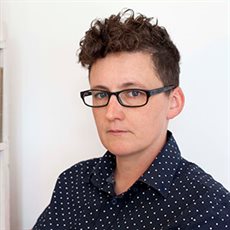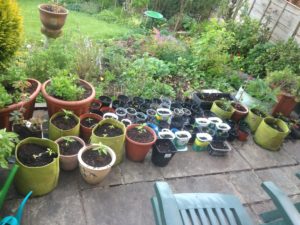1. What is your role within the History department?  I am a Senior Lecturer in the History of Race & Empire. I direct the Centre for Modern British Studies and convene the MBS MA programme.
I am a Senior Lecturer in the History of Race & Empire. I direct the Centre for Modern British Studies and convene the MBS MA programme.
2. What are your research interests? I study Britain and Ireland, focusing on the first half of the twentieth century. I’m interested in empire, in rural life, and in the lives of women and gender-non-conforming people; I’m interested in how historians can use postcolonial theory, queer theory, and the new materialism to change our understanding of the past.
3. Where did you study (UG, PGT, PGR etc.)? I did my undergraduate work at the Massachusetts Institute of Technology (it’s a long story, but it was great!), and my Masters and PhD at Brown University.
4. Did you always know you wanted to go to university or in to academia? I did not! By 13 I was really tired of school and wanted to leave as soon as possible. Later I considered a lot of different options, from veterinary medicine to law, but once I discovered History I just kept coming back.
5. How long did it take and how did you manage to fund and complete your PhD? I did my PhD in the United States, where the system is a bit different. I received grant funding from the Social Science Research Council, the Andrew Mellon Foundation, and Brown University, which funded my MA and my PhD. I did my MA in one year and immediately went on to my PhD, which took another 4 and change.
6. What was your PhD on? The social and cultural effects of Irish independence within England. I researched Irish immigrant communities, Gaelic language clubs, and the politics of the Irish Question, and ultimately concluded that this was an important aspect of how interwar Britain avoided major social unrest. I published my revised thesis as my first book, Ireland and the Irish in Interwar England (2014).
7. What are you working on at the moment? Last autumn I finished a book (Mutual Admiration Society: How Dorothy L. Sayers and her Oxford Circle Remade the World for Women) on a life-long group of friends who attended university together in the early part of the twentieth century. This was such a fun project – it gave me a chance to write biography, and to explore women’s history and queer history in new ways. The most famous member of the group was detective novelist Dorothy L. Sayers, so I also spent a lot of time immersed in Golden Age mystery novels! Right now, I’m writing a few articles, which are all, in different ways, about the nature of groups. One is on trans history and how to historicize the idea of gender; one is on African and Asian students at the Co-operative College in Manchester; and one is a queer reading of the life’s work of Irish co-operative enthusiast Sir Horace Plunkett. I’m also doing a lot of reading & dreaming up my third book – stay tuned!
8. What made you want to become a lecturer/academic? I love teaching, I love reading and talking and writing about history, and I love archival research. A job that combines all of those things is dream come true!
9. Name three books/films/podcasts you recommend to read/watch/listen to during lockdown.
- Briallen Hopper, Hard to Love: smart, trenchant essays on life and love in the modern world.
- Anna Burns, Milkman: a terrific, totally unique novel set in Troubles-era Northern Ireland
- Bryan Washington, Lot: short stories about queer love and family life in Houston, Texas. The city itself almost becomes a character.
10. What is the most historically inaccurate film or scene you have watched or read? The most enjoyable historically inaccurate film I’ve seen is Shakespeare in Love. What bothers me more than inaccuracy, as such, is when producers miss a chance because they’re not curious about wider historical issues. Don’t get me started on how Downton Abbey squandered its chance with the Irish / Tom Branson subplot!!
11. Are you staying physically active during lockdown? If so, how, and do you suggest anything? Yes. I’m very fortunate to live someplace where it’s very easy for me to get outside to walk, so I’ve been doing that a lot. I’ve also been gardening. And I’ve been catching up on yoga classes at my beloved former studio in Boston, which is now doing online classes! So that’s been quite fun. I’ve realized that, for me, consistency is key; everything is much better if I don’t skip a day of exercise of some sort.
 12. Do you have any pets? If so, what? (Pictures encouraged!) Not at the moment. But I’ve been spending so much time & energy on my seedlings I feel like they’re my pets!
12. Do you have any pets? If so, what? (Pictures encouraged!) Not at the moment. But I’ve been spending so much time & energy on my seedlings I feel like they’re my pets!
13. What is your favourite film or TV series? I love the Australian series “Miss FIsher’s Murder Mysteries.” Perfect escapist viewing, with amazing visuals! There’s a new film, too, that I haven’t had the chance to see yet.
14. Do you have a favourite band/album/genre of music? If so, what? Indie rock / pop mainly. I’ve been returning to old favourites in lockdown…
- Arcade Fire, Neon Bible and Suburbs especially
- PJ Harvey, Let England Shake
- Night House, Everyone Is Watching From Afar
15. Do you have any unusual links or claims to fame? Not really!
16. What skill would you one day like to master? I would really, really like to learn to surf. So far I haven’t gotten farther than reading up on surf schools online, but one day I’m going to take the plunge!
17. What takes up too much of your time? Like a lot of us right now, reading social media and worrying about the state of the world, honestly.
18. What songs have you completely memorized? My partner and I can sing all three verses of Simon & Garfunkel’s “Homeward Bound” – in harmony! Not bad for a historian with shaky pitch…
19. What advice would you give to your younger self? Invest in your friendships and close relationships; they’re the most important resource you have.
20. Do you have any top tips for academic work/study for our students? Go easy on yourself. Break things into small chunks, and reward yourself and praise yourself for each small step you make. And, in the words of my own undergraduate personal tutor, who was told this while doing her archival research in Russia: “Work is not a horse. It will not run away.”
